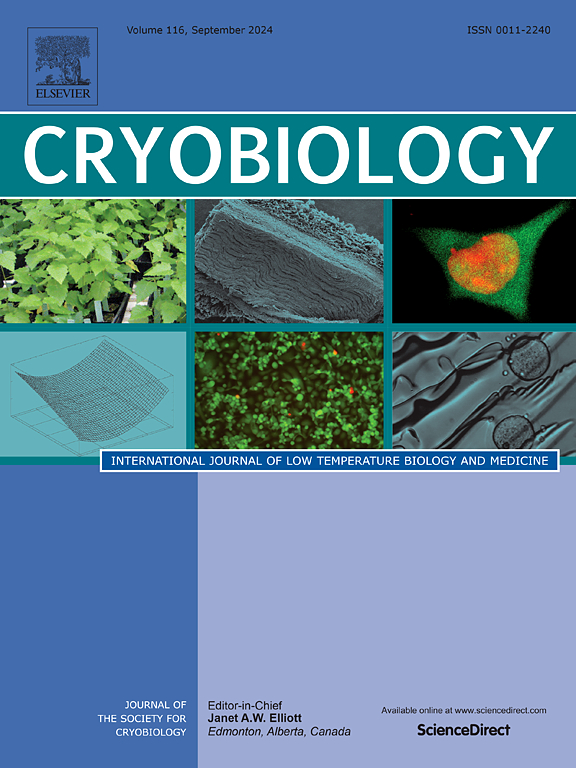小鼠冻干核体的染色体完整性
IF 2.1
3区 生物学
Q2 BIOLOGY
引用次数: 0
摘要
在哺乳动物物种中,目前没有办法在超零温度下保存成熟的卵母细胞而不进行冷冻储存。中期II (MII)卵母细胞在任何介质或溶液中冷冻干燥后不能在补液后复活。因此,冷冻干燥的MII卵母细胞对染色体的伤害作用尚未见报道。本研究的目的是检测小鼠冷冻干燥MII卵母细胞的染色体完整性。从MII小鼠卵母细胞中取出含有少量细胞质的纺锤体,即所谓的“核体”。冷冻干燥(FD)前,将核体在添加20 μmol/l γ-生育三烯醇的EGTA/Tris-HCl缓冲液中,在4℃下孵育2天(FD前孵育)。冷冻干燥后,将冷冻干燥的核体再水化并微注射到去核的MII卵母细胞中。对重建的卵母细胞进行孤雌活化,分析第一次卵裂中期的染色体。正常活化的卵母细胞中,51%注射了新鲜核体,27% - 29%注射了冷冻干燥的核体,在fd前孵育8小时至2天后,显示出正常的染色体结构。fd前孵育不足(0-4小时)导致严重的染色体损伤。相比之下,几乎所有通过新鲜核体和去核卵母细胞融合重建的孤雌胚胎(98%)都保持了正常的染色体构成。利用冷冻干燥的核质体重建和孤雌活化的部分MII卵母细胞,在保持染色体稳定性(3 - 29%)的情况下,可以发育到第一个卵裂中期(67 - 80%)。FD方法的进一步改进应提高冷冻干燥核质体的染色体完整性。本文章由计算机程序翻译,如有差异,请以英文原文为准。
Chromosomal integrity of freeze-dried karyoplasts in mice
In mammalian species, there is currently no way to preserve mature oocytes at supra-zero temperatures without cryostorage. Metaphase II (MII) oocytes freeze-dried in any medium or solution cannot be revived after rehydration. Therefore, the injurious effects to chromosomes of freeze-drying MII oocytes have not been reported. The aim of this study was to examine the chromosomal integrity of freeze-dried MII oocytes in mice. Spindle apparatuses with small amounts of cytoplasm, “karyoplasts” so-called, were removed from MII mouse oocytes. Before freeze-drying (FD), the karyoplasts were incubated at 4 °C for up to 2 days (pre-FD incubation) in EGTA/Tris-HCl buffered solution supplemented with 20 μmol/l γ-tocotrienol. After freeze-drying, the freeze-dried karyoplasts were rehydrated and microinjected into enucleated MII oocytes. Parthenogenetic activation of the reconstructed oocytes was performed to analyze the chromosomes at the first cleavage metaphase. A portion of normally activated oocytes that had been injected with fresh karyoplasts (51 %) and karyoplasts freeze-dried after pre-FD incubation for 8 h to 2 d (27 %–29 %) exhibited normal chromosome constitution. Insufficient pre-FD incubation (0–4 h) caused severe chromosomal damage. By contrast, almost all parthenogenetic embryos (98 %) reconstructed via fusion of fresh karyoplasts and enucleated oocytes maintained normal chromosome constitution. Some MII oocytes reconstructed and activated parthenogenetically using freeze-dried karyoplasts could develop the first cleavage metaphase (67–80 %) while retaining chromosome stability (3–29 %). Further improvements in FD procedures should enhance the chromosomal integrity of freeze-dried karyoplasts.
求助全文
通过发布文献求助,成功后即可免费获取论文全文。
去求助
来源期刊

Cryobiology
生物-生理学
CiteScore
5.40
自引率
7.40%
发文量
71
审稿时长
56 days
期刊介绍:
Cryobiology: International Journal of Low Temperature Biology and Medicine publishes research articles on all aspects of low temperature biology and medicine.
Research Areas include:
• Cryoprotective additives and their pharmacological actions
• Cryosurgery
• Freeze-drying
• Freezing
• Frost hardiness in plants
• Hibernation
• Hypothermia
• Medical applications of reduced temperature
• Perfusion of organs
• All pertinent methodologies
Cryobiology is the official journal of the Society for Cryobiology.
 求助内容:
求助内容: 应助结果提醒方式:
应助结果提醒方式:


